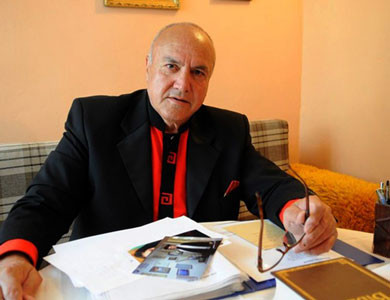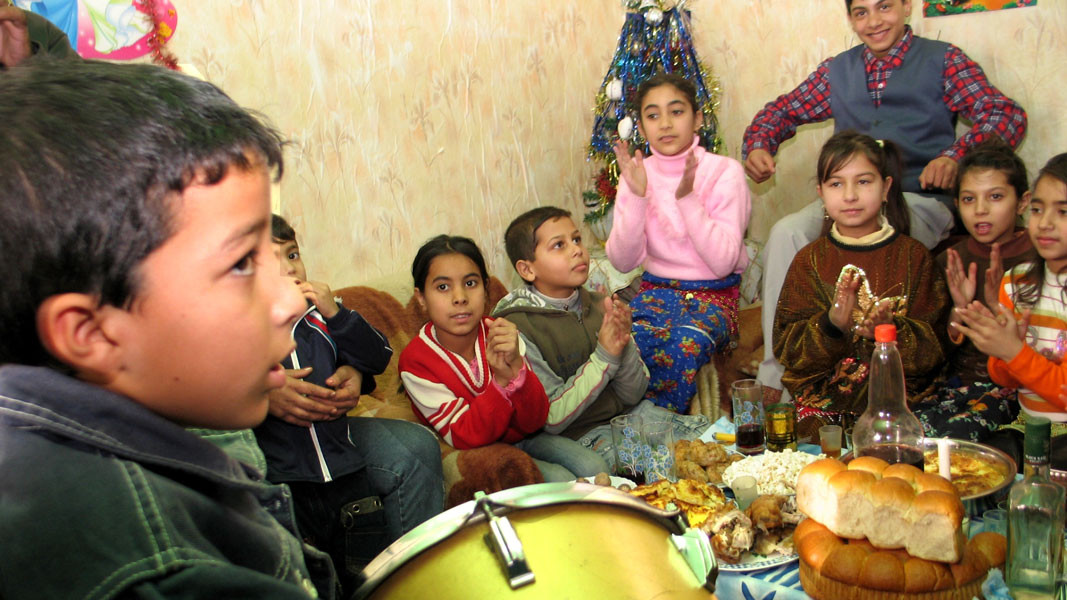They call Borislav Asenov the poet from Sofia’s Roma neighbourhood Fakulteta because of his love of poetry and the collections of poems he has written in Bulgarian and in the Romani language.
He has two university degrees – in tourism and in theology. For the latter he has his wife to thank, Slavyanka, who, after suffering a severe stroke learnt to walk again and encouraged him to study theology in Germany. Because of everything he has done for his community, at a world Roma congress, Borislav Asenov was proclaimed informal minister of culture of the European ethnic community.
On the eve of the Roma New Year, which combines in its traditions the Christian Nativity and St. Basil’s day, we present pastor Asenov who tells us all about the customs and rituals of the biggest Roma holiday – Bango Vasil and Vasilitsa:
 Bango Vasil is a holiday gypsies hold in high esteem, it is the Roma New Year. We used to be a band of kids growing up, our mother tried to keep us clean and tidy at all times, and on Bango Vasil we were given new overshoes and tracksuits. We also had a new straw mat with a table-cloth on it, on which all sorts of treats were arranged. Nobody was allowed even a single bite before midnight. And if anyone started nodding off she would wake them up with the words: “Do not sleep, Bango Vasil is at the school!” We use to live close to the school building, so that meant he would reach our house within ten minutes.
Bango Vasil is a holiday gypsies hold in high esteem, it is the Roma New Year. We used to be a band of kids growing up, our mother tried to keep us clean and tidy at all times, and on Bango Vasil we were given new overshoes and tracksuits. We also had a new straw mat with a table-cloth on it, on which all sorts of treats were arranged. Nobody was allowed even a single bite before midnight. And if anyone started nodding off she would wake them up with the words: “Do not sleep, Bango Vasil is at the school!” We use to live close to the school building, so that meant he would reach our house within ten minutes.
Borislav Asenov’s father was a tinsmith, he tinned the copperware of the people of Kostinbrod. At holiday season he had an understanding with them – he would tin their coppers in exchange for food:
They started out right before Bango Vasil and brought everything their farms produced. My father was as good as his word and so were they. They brought vegetable oil, beans, potatoes, all kinds of things. In its day our house was a solid, sturdy building. We had three rooms, and one of them was like a barn and there we put the provisions. Now things are very much changed, most of my brothers celebrate the New Year when Bulgarians do, still you have to have made a pot of sarmi (cabbage leaves stuffed with minced meat) on the 13th of January. You might not have a goose, but sarmi are a must because we all feel an inner obligation to honour the holiday. It has come down to us from a long, long time ago – from our great-grandfather, our grandfather, our father.
Bango Vasil lasted three days and was wrapped in a special kind of festive mystery. The young paid their respects to the old and asked their forgiveness. I don’t know whether my grandchildren and great-grandchildren will respect this custom, that is why I am describing it all in my books, Borislav Asenov says and adds: A nation without a past, a nation that is not familiar with its traditions is doomed.

Borislav’s father loved Bulgarian history, and when in 1961 gypsies were forced to change their names to Bulgarian names he chose the name Rakovski, and for his sons – names of Bulgarian tsars or prominent figures from the time of the national revival. He often asked Borislav to recite verses by famous Bulgarian poets to him, and gave him 20 stotinki. That was how Borislav came to love poetry. It was a love that brought him the biggest reward in his life:
I was six when our nursery school teacher took us to the only bakery in Fakulteta. She wanted to show us how bread is made. She knew I loved poetry so she taught me a poem, I remember who it was by – Nikola Furnadzhiev. And when I, a gypsy boy, went up to uncle Dushan, the baker, and recited it, something incredible happened – he gave me a warm loaf of bread, the first thing I had earned in my life! Bread – a sacred thing for a poor man!
On the eve of Bango Vasil Borislav Asenov has a message to convey to Bulgarians and Roma alike: I would like to see people grow kinder. A Happy New Year to all gypsies! God bless the entire Bulgarian people, rejoice and love this piece of land called Bulgaria!
Interview: Magdalena Gigova
Text: Darina Grigorova
Photos: osis.bg, epicenter.bg and BGNESOn January 25 this year, the Bulgarian National Radio will celebrate its 90th anniversary. The celebration will be accompanied by various initiatives, culminating in the ceremony of presenting the Annual Radio Journalism Awards "Sirak..
Bulgarian gardeners have been bringing the glory of Bulgaria to Croatia for more than a century and a half. They were true "ambassadors" of the humble and hardworking Bulgarian people, Diana Glasnova, author of the book Bulgarian Gardeners in..
Babinden, or Midwives' Day, was once again this year celebrated across the country with songs, dances and ritual re-enactments. The day of midwifery was marked on January 8, and today, following the old-style calendar tradition. On Babinden, people..
After almost 80 years, a new breeding colony of the endangered Dalmatian pelican has appeared in Bulgaria . The birds have settled on artificial islands..
The Bulgarian-Albanian Business Chamber (BABC) will support the connections between the Albanian and Bulgarian communities in the business sector, with..

+359 2 9336 661
